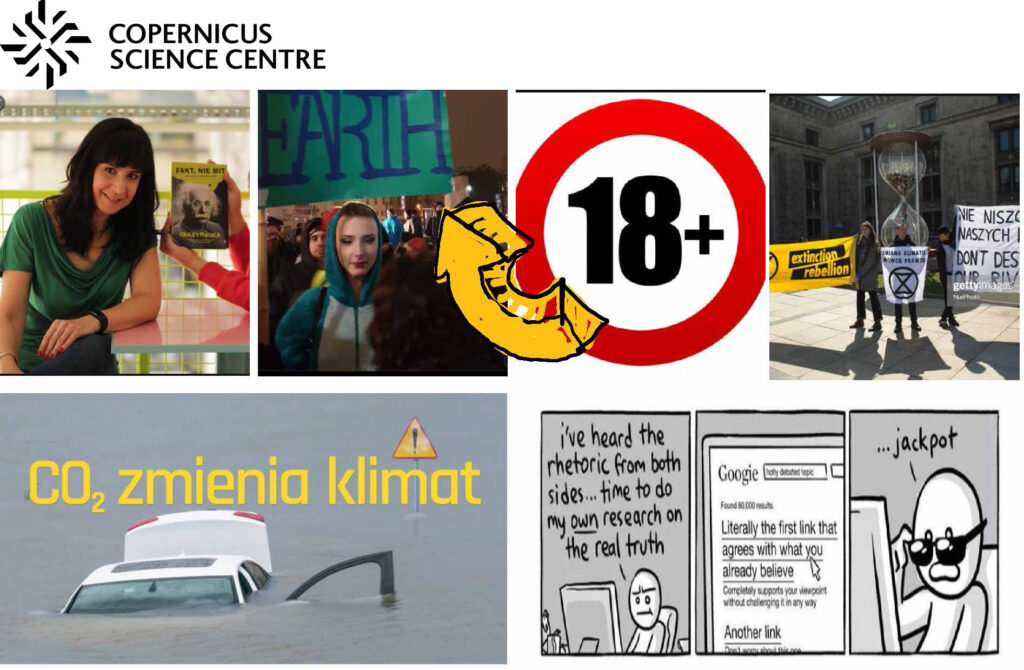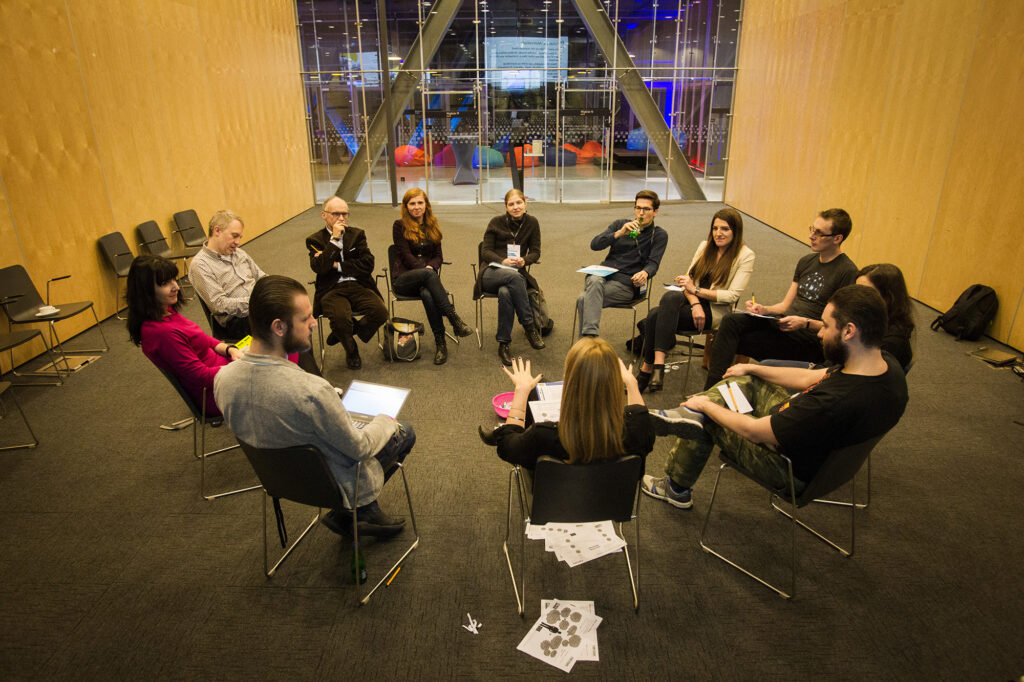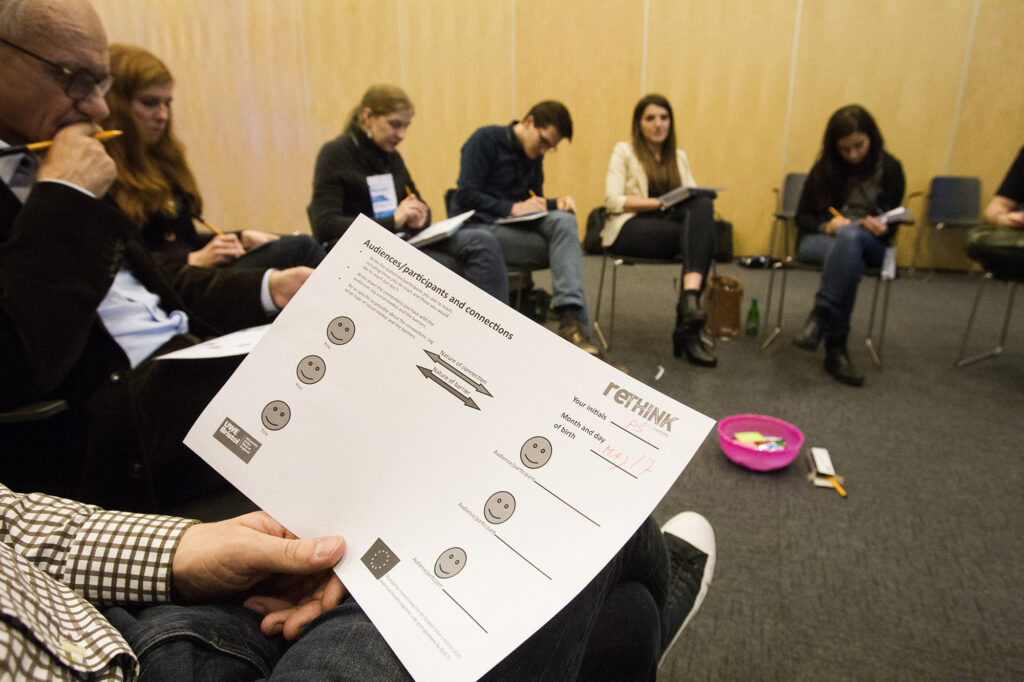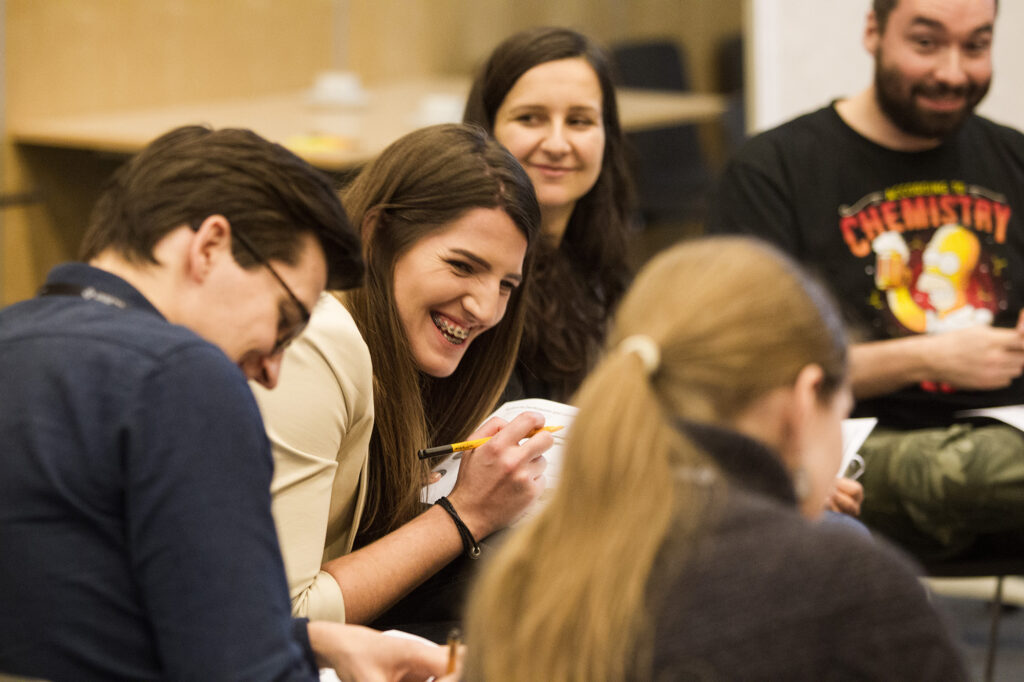
WORKSHOP #1 What do you do when you have to open the first Rethinkerspace meeting? Of course, participants should introduce themselves, but do you do next with agroup of scientists and science bloggers who meet for the first time? One possible icebreakers is to run a mini-survey with them, which in popular magazines is referred to as: “37 questions that will make you fall in love”.
As a Rethinkerspace host I was cautious – after all, I just wanted them to like each other, so I’ve chosen some questions from Arthur Aron’s research: “The Experimental Generation of Interpersonal Closeness: A Procedure and Some Preliminary findings”. Our little experiment on building closeness went surprisingly well and the level of openness was quite high in the group – probably because we left out questions about relationships with the mothers.
So after getting to know each other, we spent one hour sitting in a circle and talking about our problems – it is such a polish thing! Nonetheless, sharing the same stories gives people a sense of community and understanding, and it is easier to start talking about solutions from there.
It wasn’t all serious…there were endless anecdotes about internet trolls and fantastic conspiracy theories that give us thrills but that wasn’t enough. Due to the attention paid to the problem of cognitive biases, which are inherent in the information processing and the great emphasis placed on the issues of education, an idea that appeared and will be developed is the translation of the book “Harry Potter and the Method of Rationality”. The book was written based on the original story, but transformed through scientific method, tracking reasoning errors or other thinking traps. The book was written by E. Yudkowsky and it is a great source of engagement and knowledge about brain functioning. Our plan is to translate it with the help of crowdfunding.



WORKSHOP #2 (held in two sessions). Polish Rethinkerspace took a curious look at the sensemaking theory and is eager to talk about it in a broader context. At this stage, they see it as a tool for one-on-one interviews. The participants identified the need to develop a manual and instructions on how to use sensemaking in practice. Both workshops gave the opportunity to exchange information between professionals, which was their greatest value.

WORKSHOP #3 (June 17th, 2021). The participants agreed that it would be useful for science communicators to have meetings where they could analyze their work, the tools used, but also their reactions and barriers. This conclusion came directly from the practice with the use of diaries and daily recording of observations for a certain period of time.
Openness and reflexivity: too general, it can be used in many industries, not only in scientific communication. It can work better in direct contact (1 on 1). It is difficult to apply to larger events. Workshop participants reported the need to develop protocols of proceedings in scientific communication. It requires a lot of time and would be very difficult to apply in urgent / highly conflict situations. You can use it once in a while, but not possible to use it every day. It is necessary to analyze where there is a limit to the openness of science communicators. Science communicators must know their limits, which may differ from person to person.
WORKSHOP #4 Rethinkerspace members reflected on what they have learned along the way and brainstormed on what their individual and collective outputs can be beyond the project.
These are the main outcomes from this fourth workshop:
- Workshop participants are eager to connect with colleagues from other Rethinkspaces or to participate in joint workshops.
- They see the possibility of applying the tools developed during the project
- They see the need to continue meeting and discussing on a professional level
- They would like to continue sharing good practices
- They are interested in looking for solutions to the ills of the sciencecommunication environment
The greatest emphasis was placed on the creation of joint plans by the participants and defining the scope of cooperation among them.
Workshop #5: Sustainability of Rethinkerspaces
The final event in this series of Rethinkerspace workshops brought together all participants from the seven countries in a unique meeting focusing on experience-sharing, community building and sustainability.
Participants were involved in a series on activities with an emphasis on “speed-travels” to the 7 Rethinskerspace hubs, in which hosts presented the outcomes of their workshops on the main themes of the project: Sensemaking, quality of online science communication, openness and reflexivity and reaching underserved audiences. The hosts also invited the “visitors” from other countries to offer their perspective on the issues addressed.
These were the issues that were discussed extensively.
- Scientists involved in research are failing to understand and/or value science communication.
- Mainstream journalists are lacking the necessary scientific knowledge.
- Audiences are wide and diverse, with those involved in science communication finding difficult to locate their particular audiences and knowing what their audiences are seeking in terms of scientific information and knowledge.
- Science communication must communicate something bigger than information and knowledge: values. And this is probably its greater differentiator from pure science and knowledge transfer.
- The role of emotions in how audiences interact with science is too important to be ignored in strict positivistic approaches.
